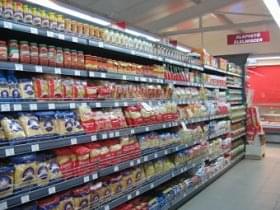Csányi Sándor proposes VAT reduction and reverse taxation
The Hungarian government should reduce the rate of VAT on basic food items and could introduce reverse taxation in the whole sector to fight against tax fraud that costs billions odf euros – proposes Csányi Sándor, the owner of the Bonafarm Group in an interview with Reuters. The VAT reduction is not far from the ideas of the government, as in the past, Orbán Viktor and Matolcsy György had a similar opinion.

According to industry experts and according to the own estimates of the Bonafarm Group, 1000-2000 billions of forints of Vale Added Tax cannot by collected in Hungary annually, half of this amount is related to the food industry – Csányi said.
Csányi, whose Bonafarm group controls big chunks of the country's meat and dairy industries, told Reuters in an interview that without further measures Hungary risked allowing most of the sector to slip into the black market.
Bonafarm has teamed up with U.S.-based farming group Bunge to highlight the scale of the fraud and press the government to find an effective solution.
“This is not a new phenomenon. This has existed ever since the inception of VAT,” said Csányi, who also heads OTP Bank, central Europe's biggest independent lender.
“But the bigger the difference between the Hungarian VAT rate and the VAT rates of neighboring countries, the stronger the incentive to cheat and seize markets share,” he said.
“If we combine VAT fraud and the advantages from black market deals, then farmers operating in this illicit zone have a cost-side advantage of more than 50%,” he added.
“This entire chain should be tackled in an appropriate way, or else legal players will pay ever more in taxes and be priced out of the market… Ultimately the Hungarian food industry will be one big black market.”
Csányi said the solution lay in reducing the VAT on basic foods from 27%, the EU's highest rate, to discourage fraudsters from profiteering.
A VAT rate between five and 10% would stop fraudsters gaining market share as it is similar to rates in neighbouring countries, he said, adding that processed foods should be taxed at a lower rate of around 20%.
Another remedy would be reverse taxation, when the VAT is paid by the buyer not the seller, as it is much more difficult to abuse that system, he said.
The Hungarian parliament has passed a bill to introduce reverse VAT for a limited segment of the food industry, but Csanyi said that was not enough to tackle the problem.
“In general I think the payment and reclaim process of VAT is inappropriate in the entire EU,” he said. “VAT fraud is everywhere… I would introduce reverse VAT in the entire agricultural sector.” (portfolio.hu)
Related news
Related news
Eckes-Granini acquires fruit juice concentrate producer in Germany
Eckes-Granini, one of Europe’s leading juice producers, has acquired Wolfgang…
Read more >The latest issue of Trade magazine is out now!
This time the digital version has been extended to 192…
Read more >After a subdued year, the holiday season is strong
74% of online shoppers, around 3.1 million people, are preparing…
Read more >





